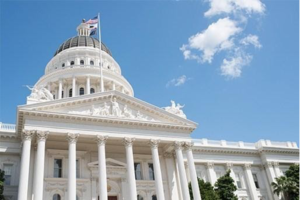By Abraham Han, Management Analyst

Despite the ongoing COVID-19 pandemic, the legislative landscape has been a very active one during 2020. Over the past few months, the California Joint Powers Insurance Authority’s (California JPIA) staff and business partners have highlighted several different bills that are of significant interest from a liability or workers’ compensation perspective.
In an effort to highlight many of those bills of interest in one place, this legislative update serves to briefly summarize particular bills that California JPIA staff thinks may have the biggest impact on agencies. Each summary will include a link to a deeper dive and analysis of the bill’s implications, as provided in previous articles.
AB 685: COVID-19: imminent hazard to employees: exposure: notification: serious violations
AB 685 imposes new reporting requirements and expands Cal/OSHA’s authority regarding COVID-19. The bill focuses on an employer’s responsibility on how to respond once a notice of potential exposure to COVID-19 is received. There are specific steps that employers must take in that response. Details on what those steps entail, as well as additional resources, can be found in this article.
AB 685 goes into effect on January 1, 2021, though the requirement to notify local health departments is currently in effect.
AB 992: Open meetings: local agencies: social media
AB 992 clarifies the interaction between social media and the Brown Act, and which kinds of social media communications and interactions are allowed (or not allowed). Officials subject to the Brown Act are allowed to communicate with members of the public on social media, but they should not directly respond or react to anything posted or shared on social media regarding agency business by another member of the same legislative body. A more detailed overview from a legal perspective can be found in this article.
AB 992 goes into effect on January 1, 2021.
AB 1286: Shared mobility devices: agreements
AB 1286 impacts how shared mobility service providers (e.g., Lime, Bird, etc.) can operate within a local jurisdiction. Further, the bill imposes certain requirements on cities and counties to adopt certain rules when those shared mobility service providers operate within the jurisdiction. The bill also requires certain insurance coverage with minimum limits.
AB 1286 goes into effect beginning January 1, 2021. However, certain provisions may extend the requirement to January 1, 2022, depending on the circumstances. A more detailed overview from a legal perspective can be found in this article.
SB 1003: Skateboard parks: other wheeled recreational devices: safety and liability
SB 1003 extends immunity to local governments which operate skateboard parks. Now along with skateboards, the bill extends local government immunity at local skate parks for other recreational devices such as bicycles, scooters, and wheelchairs. It is important to note that certain conditions must still be met in order for hazardous recreational activity immunity to apply within a skateboard park. The SB 1003 text should be thoroughly reviewed to determine all conditions that must be met in order to uphold the hazardous recreational activity immunity.
Since SB 1003 was passed as an urgency measure, it went into effect immediately.
SB 1159: Workers’ compensation: COVID-19: critical workers
SB 1159 creates a rebuttable presumption for COVID-19 that covers a wide range of employees, including the following:
- Firefighters
- Peace officers
- Emergency medical technicians
- Fire and rescue service coordinators
- Registered nurses
- Home health agency employees who provide “direct patient care”
- Certain health facility employees
- In-home supportive service employees providing care outside of their own home
The presumption applies from July 6, 2020 through January 1, 2023. This article discusses the specifics of issues such as how long an employer has to investigate a claim that is eligible for this presumption, what type of testing must be performed, how workers’ compensation benefits interact, and other additional employer responsibilities as a result of SB 1159.
Since SB 1159 was passed as an urgency measure, it went into effect immediately.
The Authority will continue to track various bills, especially as the 2021-22 Regular Session is scheduled to convene on December 7, 2020.
Providing innovative risk management solutions for its public agency partners for more than 40 years, the California Joint Powers Insurance Authority (California JPIA) is one of the largest municipal self-insurance pools in the state, with more than 120 member cities and other governmental agencies. Members actively participate in shaping the organization to provide important coverage for their operations. The California JPIA provides innovative risk management solutions through a comprehensive portfolio of programs and services, including liability, workers’ compensation, pollution, property, and earthquake coverage, as well as extensive risk management training and loss control services.

